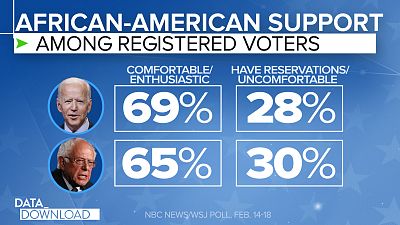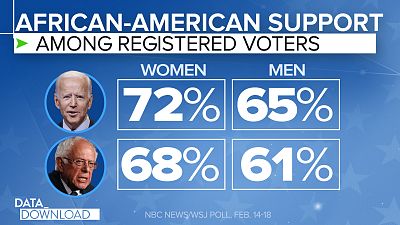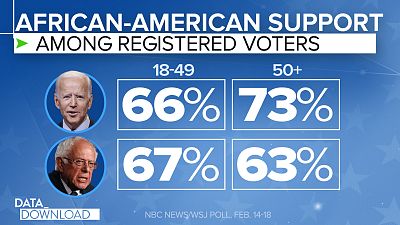The latest NBC News/WSJ poll shows that Biden fares best among all Democrats with African-American voters, but the gap is not as wide as one might think.
WASHINGTON - Next week the Democratic nominating process moves to South Carolina and to a very different electorate. For months, the state's African-American population has been seen as a kind of firewall for former Vice President Joe Biden - a group of voters who would support him even if he had a tough first few contests.But new numbers from the latest NBC News/Wall Street Journal pollsuggest that theory may be a little simplistic and the biggest gainer in Biden's early struggles may be Vermont Sen. Bernie Sanders.The data show that Biden fares best among all the Democrats with the number of African-American voters who are "comfortable with" or "enthusiastic" about him, but the gap is not as wide as one might think.
Almost 70 percent of African-American voters say they are comfortable/enthusiastic about Biden, while only 28 percent say they are uncomfortable or have reservations. That's a net positive of 41 points for Biden among those voters.But not far behind Biden is Sanders. The Vermont senator's enthusiastic/comfortable number is 65 percent and his uncomfortable/reservations number is 30 percent - for net positive of 35 points for Sanders.Those two candidates do much better with black voters than the rest of the field, including Sen. Elizabeth Warren who has a net positive of 11 points and former New York Mayor Michael Bloomberg, with a net positive of 1 point.With South Carolina's primary looming on Saturday, those poll numbers take on a special significance. In 2016, 61 percent of the state's Democratic primary electorate was African-American.It should be noted that all the Democratic potentials stand far above President Donald Trump with African-Americans. Only seven percent of those voters are comfortable with or enthusiastic about Trump, while 92 percent are uncomfortable with or have reservations about him. That's a net negative of 85 points. But Biden and Sanders look to be especially well-positioned for the South Carolina Democratic vote.For Biden and Sanders, the African-American support looks pretty similar.
Both candidates do slightly better with women than they with men, by about seven points. As one might expect, Sanders does a bit better with younger African-American voters and Biden does better with older African-Americans. And Sanders does slightly better with African-Americans who have a college degree, but he and Biden are very close to those numbers.In this way, the black vote looks a little different than the Democratic vote overall, where Sanders tends to do much better young voters. In fact, these data seem to suggest that Sanders has become an acceptable option for a wide range of African-Americans, perhaps benefitting from his good showings in Iowa and New Hampshire and the familiarity that comes with a second run at the White House.And there's one other bit of good news in these data for Sanders. With Democrats focused on bumping up their candidates' margins and turnout among African-Americans in November, the Vermont senator seems to have some pull in a head-to-head against Trump.
Biden beats Trump by about 80 points in a head-to-head race 89 percent to 8 percent. But Sanders holds a similar edge, 87 percent to 7 percent. That's not a measure of turnout, of course. It doesn't reveal anything about Sanders's ability to bring voters to the polls, but those margins show very solid edges for both Biden and Sanders.It's not clear what any of this will mean for South Carolina next week. The campaigning has been going on there for months now and other factors, such as endorsements and turnout machines, will likely play a big role in the results.But if these data are born out in the results, Biden's firewall may be a lot weaker than it once looked. And the figures have meaning well beyond one state.Sanders had big struggles in 2016 in states such as Alabama, Georgia, Louisiana and Mississippi, where African-Americans made up a majority of the Democratic primary vote. He didn't get even 30 percent of the vote in those states. These numbers suggest the 2020 southern swing could be better for him.














